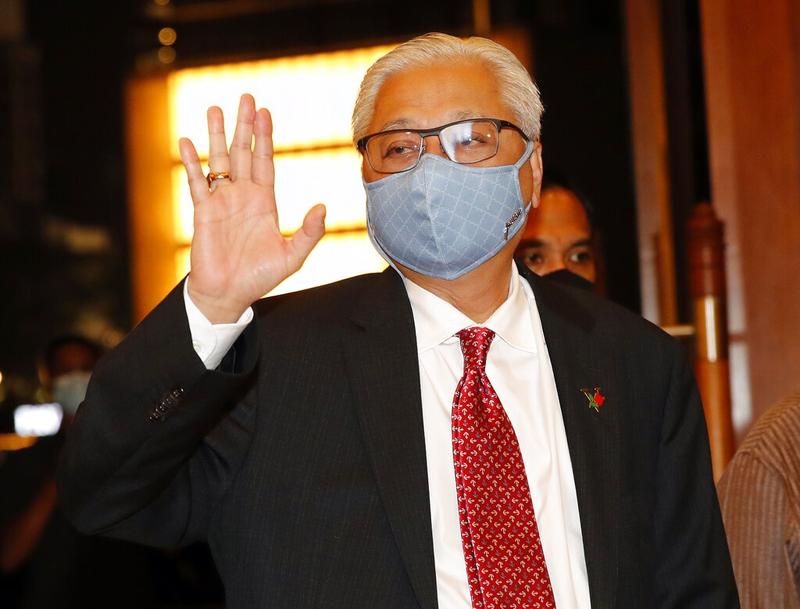 Malaysia's newly appointed Prime Minister Ismail Sabri Yaakob waves to the media at a hotel in Kuala Lumpur, Malaysia, Aug 20, 2021. (FL WONG / AP)
Malaysia's newly appointed Prime Minister Ismail Sabri Yaakob waves to the media at a hotel in Kuala Lumpur, Malaysia, Aug 20, 2021. (FL WONG / AP)
Malaysia’s new Prime Minister Ismail Sabri Yaakob faces a tough road ahead as he has to manage a worsening pandemic and chaotic politics that has hounded the country for the past year, analysts said.
Ismail Sabri, 61, will take office on Aug 21 as Malaysia’s ninth prime minister, replacing Muhyiddin Yassin who resigned on Aug 16 as he no longer enjoyed the support of the majority of members of parliament.
King Sultan Abdullah Ahmad Shah made the appointment as the former deputy prime minister has the support of the majority of the parliament, according to the palace statement released on Aug 20.
READ MORE: Malaysia's new PM Ismail Sabri to be sworn in on Aug 21
The new Cabinet needs to transcend political borders to “reduce politicking and obviate the possibility of motions of no confidence that distract attention from handling the pandemic,” said Ahmad Fauzi Abdul Hamid, professor of political science at the Universiti Sains Malaysia
The monarch is hoping that with Ismail Sabri’s appointment, the government can continue its efforts to combat the pandemic.
“The King is constitutionally obliged to pick the one who carries the majority votes,” said Ahmad Fauzi Abdul Hamid, professor of political science at the Universiti Sains Malaysia.
He said Ismail Sabri needs to be “wise enough to be able to gauge public sentiment” and must appoint Cabinet members based on competence and merit. The new Cabinet needs to transcend political borders to “reduce politicking and obviate the possibility of motions of no confidence that distract attention from handling the pandemic”.
James Chin, professor of Asian Studies at University of Tasmania in Australia, said Ismail Sabri’s appointment will end political bickering for now in Malaysia as the new government has the King’s support.
“Malaysia can’t afford another regime change. It’s too disruptive,” Chin said, noting that the new government needs to focus on vaccinating more people as cases continue to climb.
Malaysia’s vaccination rate is one of the highest in Asia, with more than 50 percent of its population having received their first dose of vaccine as of Aug 19.
But the country has also one of the highest number of COVID-19 cases in the region, with the entry of the highly-transmissible Delta variant infecting more people. Malaysia has over 1.4 million cases, with more than 22,000 new infections recorded as of Aug 20, according to the World Health Organization.
“Managing the pandemic takes precedence and priority above all else,” said Aira Azhari, manager of the Democracy and Governance Unit at the Institute for Democracy and Economic Affairs, a Kuala Lumpur-based think tank.
Aira is expecting the incoming government to implement consistent and effective policies that can help in reducing the number of infections.
“The new governmentmust make decisions based on facts and science. They must be open to new strategies and ideas from experts and civil society. Transparency must be upheld when making decisions,” she said.
Aira said the incoming government also needs to protect civil liberties and uphold the rule of law amid the pandemic.
A veteran politician, Ismail Sabri also served as defense minister in Muhyiddin’s Cabinet, besides being his deputy. He is also vice-president of the United Malays National Organization – one of Malaysia’s biggest political parties. UMNO is a major force behind Perikatan Nasional – the ruling coalition that supported Muhyiddin.
Muhyiddin’s resignation came after a 17-month rule that was marked by political infighting and widespread criticism over the government ‘s handling of the pandemic.
With Ismail Sabri’s appointment, analysts are hoping that the political bickering will be finally put to rest so that the government can focus on the pandemic and find ways to revive an economy that was dragged down by lockdown measures and border closures.
Ahmad Fauzi of USM said Ismail Sabri’s government needs to have a more conciliatory approach towards other political players.
“I believe that a national unity cabinet that accommodates the rival political factions is what the King and people want,” he said.
ALSO READ: Resignation of M'sia PM adds challenges amid pandemic fight
Aira of IDEAS said the political fragmentation in Malaysia goes beyond the question of who is the prime minister.
“There has been a serious breakdown in trust between politicians themselves, between politicians and the people, and between government and the people,” she said.
Aira said that it is this “trust deficit”that will makeit very difficult for the next government to enforce policies.
“This crisis will most likely prolong until an election is called, but even then, because of the fragmentation, it is not likely that one party will win a comfortable majority,” she said.


